Olin Business School recognized the achievements of four alumni during the annual Distinguished Alumni Awards Ceremony held April 5 at the Ritz Carlton, St. Louis.
Mahendra R. Gupta, PhD, dean and the Geraldine J. and Robert L. Virgil Professor of Accounting and Management, hosted the event.
The Distinguished Alumni Awards honor Olin Business School alumni who have attained distinction in their careers. Those being honored share the characteristics of leadership: progressive thinking, high standards, uncompromising integrity, commitment, courage and confidence. Their careers serve as models for all WUSTL students and alumni.
Gupta also presented the Dean’s Medal to Joanne and Charles F. Knight and Carol and George Bauer. The Dean’s Medal is awarded to Olin friends whose dedication and service to the school have made a significant difference.
Distinguished Alumni
Scott B. Helm (BSBA ’87), introduced by Gary M. Hochberg, PhD, director of specialized master’s programs at Olin
Helm is a co-founder and partner at Energy Capital Partners, a New Jersey-based private equity firm focused on investing in North American energy infrastructure.
The company has raised around $7 billion in equity funds over the past seven years. Its holdings include companies in electric power generation, renewable energy, electric transmission, gas storage and pipelines and other energy assets.
After graduating, Helm entered the investment world as an analyst in the fixed-income division at Goldman, Sachs & Co. in Chicago. By 1990, he was promoted to associate in the investment banking division and, in 1994, to vice president.
His work there with commodity cyclical businesses led him to help launch Orion Power Holdings Inc. in 1998, where he served as chief financial officer.
At Orion Power, he helped lead seven acquisitions totaling $3.2 billion and led eight financings that raised another $2.7 billion in support of those acquisitions. He also was responsible for several expansion and risk-management projects.
Paul A. Koch (BSBA ’61, JD ’64 and MBA ’68), introduced by Robert E. Lefton, PhD, president and CEO of Psychological Associates Inc.
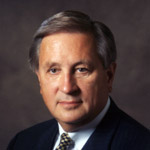
Koch is co-chairman of the board at Koch Development Co.
Koch and his brother Roger Koch are the third generation in the real estate investment and development business and jointly own Koch Development Co. As principals and board members, he and Roger are responsible for the overall strategic direction of the company.
Koch has more than 50 years of entrepreneurial experience in real estate. He started his real estate development and homebuilding business in 1961. He and Roger combined most of their businesses two years later. The two brothers are both experienced in land development, as well as real estate investment, construction and management. Their experience encompasses residential, office, retail and industrial real estate, and real estate brokerage.
After a three-year U.S. Air Force stint as a judge advocate trial attorney, Koch returned to St. Louis in 1967 to start his home construction and real estate brokerage business while earning an MBA. His brother joined him in 1969 after military service. Koch Development now has a portfolio that consists of office, retail, entertainment and industrial investment properties in seven states.
Roger L. Koch (BSBA ’64 and MBA ’66), introduced by Robert E. Lefton, PhD, president and CEO of Psychological Associates Inc.
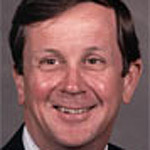
With his brother Paul, Koch is co-chairman of the board at Koch Development Co.
In addition to his work in Koch Development Co., Roger Koch was the majority owner and controlled numerous partnerships outside the family business investing in properties in Missouri, Minnesota, Michigan and Illinois.
He was a National Association of Securities Dealers licensed broker and dealer for direct participation programs, licensed insurance broker and licensed real estate broker. He has handled the sale, acquisition and financing of numerous properties for Koch Development Co. and its affiliates.
He served as an officer in the U.S. Air Force, specializing in logistical systems auditing. He is a life member of the Institute of Real Estate Management and has extensive professional education, including all course work required for the MAI designation.
Koch served as chairman of the board of Mark Twain South County Bank for 16 years and was a member of the Mark Twain St. Louis Bank board.
Merry L. Mosbacher (MBA ’82), introduced by James D. Weddle, managing partner of Edward Jones Investments
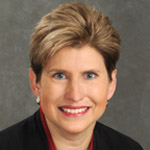
Mosbacher is principal of the insurance marketing department at Edward Jones. She leads the firm’s efforts to market and distribute insurance and annuity products, which account for some $8 billion in annual sales and 18 percent of the firm’s overall trade revenue.
She oversees 23 employees and is responsible for the sale of insurance products — variable, fixed and immediate annuities and insurance for both life and long-term care — through the firm’s 9,800 branches in the United States, Canada and the United Kingdom.
During her 17 years in insurance marketing, she has contributed to the insurance industry by working with companies to enhance the value provided to clients through new product designs and client service innovation.
She previously worked in the investment banking department, where she was responsible for more than 60 public offferings.
She began her career at Edward Jones as a student intern while working on her MBA at Olin. She joined the company’s investment banking department full time in 1982 and was named a principal four years later. In 1994, she assumed responsibility for the insurance marketing department.
Dean’s Medalists
Joanne and Charles F. Knight have a long history of generosity to countless organizations, which have had a profound impact on the St. Louis region, especially in the areas of cancer research, health and wellness, and business education.
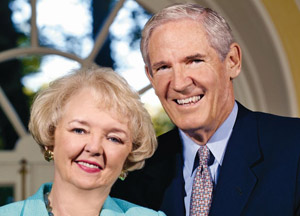
Joanne Knight served on the Alvin J. Siteman Cancer Center Community Advisory Board and the Knights endowed the Joanne Knight Breast Health Center. Chuck Knight chaired Barnes Hospital, helped create Barnes-Jewish, where he is emeritus chair for life, and engineered the formation of BJC Health System.
The Charles F. Knight Emergency and Trauma Center at Barnes-Jewish Hospital was named in Knight’s honor.
Together, they established the Charles F. and Joanne Knight Distinguished Professorship in Orthopaedic Surgery and provided significant funding for the Alzheimer’s Disease Research Center.
Joanne Knight is an active community leader who has served on the boards of Central Institute for the Deaf, St. Luke’s Hospital and the St. Louis chapter of the Alzheimer’s Association.
Chuck Knight led Emerson for three decades until his retirement in 2004. Widely recognized by his peers around the country, Knight has been a leader at WUSTL where he served as a trustee from 1977–1990.
He has had a profound influence on the development of Olin Business School since 1980, when he chaired the Business Task Force that recommended further development of the school, including new facilities named for John E. Simon.
His leadership spurred the expansion of executive education through the building of the Charles F. Knight Executive Education & Conference Center.
In late 2011, the Knights stepped forward with a gift of $15 million to support the construction of a new building adjacent to the Charles F. Knight Executive Education & Conference Center.
This new facility will provide the foundation for Olin’s second century of top-ranked undergraduate and graduate business programs, which have grown steadily since the establishment of the school in 1917. The building will be named Knight Hall in recognition of the Knights’ extraordinary generosity and visionary leadership.
Carol and George Bauer, through the Bauer Foundation, have helped countless individuals and organizations by making investments in education and improving the lives of underprivileged children all over the world.
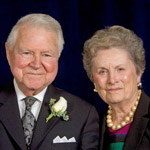
In Thailand, they helped establish the New Life Center that serves as a halfway house providing shelter, education and vocational training for 50 rescued adolescent girls. Closer to home, they sponsor the “I Have a Dream” program for children in South Norwalk, Conn.
They have provided substantial scholarships at WUSTL and, in 2004, established an endowment that provides emergency financial aid to students who experience unforeseen financial problems.
Their impact on Olin Business School has been tremendous. In 2007, they established the George and Carol Bauer Professorship in Organizational Ethics and Governance, which affirmed Olin’s resolve to educate its students in corporate governance, and to advance personal and professional ethics. The appointment of Stuart Bunderson, PhD, as the George and Carol Bauer Professor was announced in 2010.
In late 2011, the Bauer Foundation stepped forward with a gift of $10 million for Olin Business School to support the construction of a new building. The building will be named Bauer Hall in recognition of the Bauers’ extraordinary generosity.
Carol Bauer has served in many nonprofit leadership roles, including chairman of the board of Norwalk Hospital in Norwalk, Conn. She is distinguished for her role as a philanthropist and has been the recipient of the Connecticut Philanthropist of the Year award, the Rotary Foundation’s Paul Harris Fellow Award and a participant in the Norwalk Chamber of Commerce Athena Recognition. Carol Bauer also serves as a hospital chaplain.
An active alumnus, George Bauer serves on WUSTL’s New York Regional Cabinet, the Board of Trustees and Olin’s National Council. George and Carol Bauer together received the Robert S. Brookings Award in recognition of their extraordinary generosity and commitment.
George received a Distinguished Engineering Alumni Award from the School of Engineering & Applied Science, where he earned a bachelor’s degree in industrial engineering in 1953 and a master’s degree in engineering from the Sever Institute in 1959.